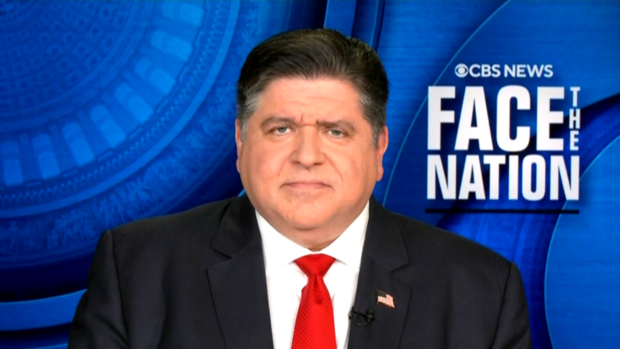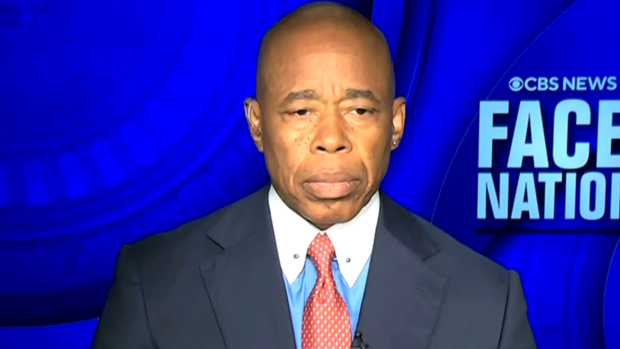Illinois Governor JB Pritzker has reiterated his calls for federal support as communities in his state, and others across the U.S., struggle to manage the influx of migrants arriving on buses from the southern border.
After writing a letter to President Joe Biden last week that laid out a list of requests and recommendations for how Biden’s administration should address the asylum crisis, Pritzker said that “we need help from the White House” in an appearance on “Face the Nation” Sunday.
Sanctuary cities in a number of Democratic states over the last year have had to grapple with a record surge in asylum seekers being bussed in from southern states like Texas and Florida. At the same time, the Biden administration faces the broader challenge of addressing a historic increase in border crossings. The influx of asylum seekers has put significant strain on Chicago and New York City, which have borne the brunt of the crisis.
Pritzker told “Face the Nation” moderator Margaret Brennan that he hopes the White House will assemble one office and a specific department head that Illinois leaders can coordinate with as they work to meet the needs of asylum seekers in their state.
“Because, look, we’re providing shelter as best we can and providing for the needs of these folks arriving in Chicago. And as I say, we’re a welcoming state and we understand the humanitarian crisis that we’re addressing,” Pritzker said. “But we can’t address this all by ourselves, and we need help from the White House.”
The governor asked for more communication with the Biden administration “so that we can understand who’s arriving, and when they’re arriving, and whether they have relatives already in the United States who might be able to help care for them.”
CBS News
“On top of the 15,000 that have arrived in Chicago and Illinois over the last 13 months, we are now seeing busloads [of] more migrants at increasingly higher rates being sent specifically to Chicago each day,” Pritzker wrote in his letter to Mr. Biden, adding, “Most critically, the federal government’s lack of intervention and coordination at the border has created an untenable situation for Illinois.”
Pritzker said he felt as though the administration “heard” him.
“We were very clear in our communication with the White House that what we need is logistical support, that is help deciding where these folks are to go, because they can’t all go to Chicago and New York, and D.C.,” he said. “They need to go in places where there’s even more help to offer. We, of course, are a welcoming state and have been caring for the people who’ve arrived. But we can’t bear the burden only ourselves.”
The governor said the asylum crisis “needs to be a federal, national problem that gets handled at the national level,” and suggested the Biden administration coordinate with politicians in border communities in Texas to regulate how and where people are dispersed in the country after crossing the border.
New York City Mayor Eric Adams traveled to Mexico and Central America last week to meet with lawmakers and try to address the asylum crisis. Adams’ trip also intended to deliver a message to migrants that New York City has reached capacity, and asylum seekers are being misinformed about the availability of jobs and shelter in New York, which have run out, CBS New York reported.
Adams said on “Face the Nation” Sunday that more than 3,700 asylum seekers arrived in New York City in the last week of September alone.
CBS News
“That’s an increase. We were getting 600 a week, which was unsustainable. And now we’re up to … getting anywhere from eight- almost 800 a week,” he told Brennan. “These numbers are not sustainable. And it’s not sustainable in Chicago when people are living in police precincts, Los Angeles, Houston, Washington. This is just not right, what is taking place.”
The mayor recently asked a court to temporarily pause New York City’s right to shelter mandate, arguing that the city does not have enough resources to handle the number of migrants arriving there. The move came under some scrutiny as critics questioned how lifting the mandate could contribute to New York City’s homelessness problem, which is already severe.
“Our legal team is not asking for a suspension. We want clarification,” Adams said on “Face the Nation.”
“This is a humanitarian crisis that we are facing,” he continued. “This is not what the architects of right to shelter thought about when you were dealing with those New Yorkers who needed shelter. We can’t have a rule that one can come from anywhere on the globe and come to New York City and remain in New York City as long as they want and taxpayers must pick up the cause. … It is unfair to the migrant seekers and asylum seekers. And it’s also unfair to … New Yorkers.”

